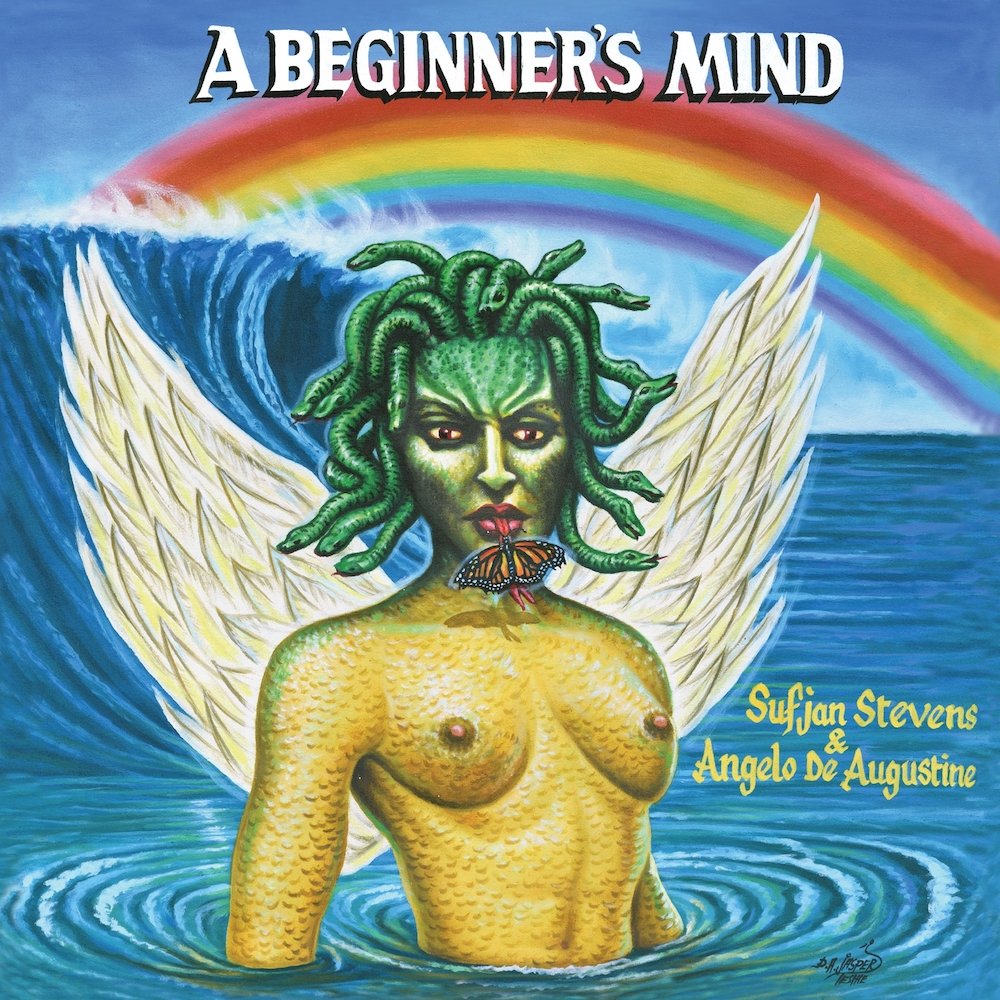Sufjan Stevens is no stranger to stepping into another character’s shoes for the sake of a song. In “John Wayne Gacy Jr.” from his landmark album Illinois, he examines the eponymous Chicago serial killer, even going as far as comparing himself to the killer with lines like “And in my best behavior / I am really just like him.”
On A Beginner’s Mind, the first collaborative album from Stevens and his label mate and friend Angelo De Augustine, the pair take this concept to a whole new level. The two wrote the album during a month-long sabbatical in upstate New York, where they watched films at night and workshopped songs inspired by them the following day. Incorporating elements from nearly every of Stevens’ past musical styles while simultaneously folding in the subtle creative quirks of De Augustine could have very well ended up a mishmash of sonic detours and half-baked ideas, but the duo manage to emerge as a match made in heaven. The songs don’t deliver as much of a gut-wrenching punch as Stevens’ most essential work, but the results are surprisingly fleshed out and endlessly listenable.
Derived from the Zen Buddhism concept of ‘Shoshin’, A Beginner’s Mind was created from a place of openness and without preconcepion of what it might inevitably become. Similarly, while loosely based on films, the songs are not limited to interpretation in that strict context. Many of the tracks drop subtle (or not so subtle) nods to their cinematic precursors, but don’t always rely on the source material to derive meaning. On “You Give Death a Bad Name”, it’s immediately clear the inspiration came from George A. Romero’s pioneering zombie flick Night of the Living Dead, but the lyrics remain just vague enough to leave room for multiple decryptions. Lines like “Was it for profit or was it for gain / You gave it your all; you gave life a bad name” and “Shot to the heart, God bless America / Failed from the start, what are you waiting for?” not only seem to explicitly reference Bon Jovi’s “You Give Love a Bad Name” but reflect some of Romero’s film’s critiques of American capitalism and racial division in the 1960s. Due to the fragmented presentation of the lyrics, though, it’s easy to elicit new meanings — ones entirely separate from the context of the film.
The rest of the songs follow suit, occasionally name-dropping main characters (Clarice from Silence of the Lambs in “Cimmerian Shade”) or even the titles of the films themselves (Bring It On Again in “Fictional California”), but Stevens and De Augustine slot these references into the tracks so neatly, they could be overlooked without prior knowledge of the films that inspired each song.
This method does, however, come with a drawback. The lyrics often feel detached and voyeuristic — even when Stevens and De Augustine write in the first person, it comes across as the perspective of other characters rather than personal statements. This eliminates some of the immediate relatability and empathetic response that often grabs hold of you in their other work in favor of broader interpretation.
Musically, A Beginner’s Mind is just as gorgeous and enveloping as you’d come to expect from Stevens and De Augustine. The record takes many of its musical cues from Stevens’ prolific and ever-evolving repertoire with tender folk at its center. The relatively energetic “Back to Oz” recalls the Illinois era with its steadfast live drum kit, bright bells, and resonating synthesizers that mimic a horn section. Meanwhile, “Cimmerian Shade” and “Lacrimae” combine gentle acoustics with new-age electronic flourishes reminiscent of Stevens’ heartwrenching masterpiece Carrie & Lowell.
The music isn’t all Stevens, though, and De Augustine’s contributions are clear from the start. With less of a track record than Stevens to pull from, it’s easier to make comparisons to Stevens’ extensive catalog, yet De Augustine’s presence is equally present across the album. For instance, the subdued, lo-fi production on the divine “It’s Your Own Body And Mind” harkens back to De Augustine’s 2017 album Swim Inside The Moon.
A press release for A Beginner’s Mind said the two musicians “wrote in tandem — one person writing a verse, the other a chorus,” and the organic nature of their creative process is evident. Stevens and De Augustine frequently trade off singing duties as well, their angelic falsettos weaving and interlocking into one another like soft fabrics in an elaborate tapestry. The pair have a sixth sense for vocal harmonies, crafting serene moments of push-and-pull as they play off one another while still allowing moments for each singer to shine on their own. “Fictional California” exemplifies this ability, particularly during its final minute where the harmonies cut out and De Augustine’s airy voice moves front and center, grabbing your attention and holding you at the edge of your seat. In that moment, we are right there with the character, experiencing their inner conflicts firsthand: “I’m all alone at the megaphone / I’m all psyched up as I make my mark in total darkness / I look alive but I feel so dead inside, I’m bleeding / Gonna break a leg with the basket toss / For the loss of my broken dreams,” he sings.
Even if A Beginner’s Mind is merely a spin-off made by two close friends while they watched movies in a secluded cabin for a month, it serves as somewhat of a palate cleanser from Stevens’ dense and often difficult album The Ascension while being a showcase for De Augustine’s evolution as a songwriter and musician. A Beginner’s Mind proves the two are not only capable of making beautiful music as a duo, but bodes well for their solo work to come — it’s yet another captivating plot point in their overarching narratives.

